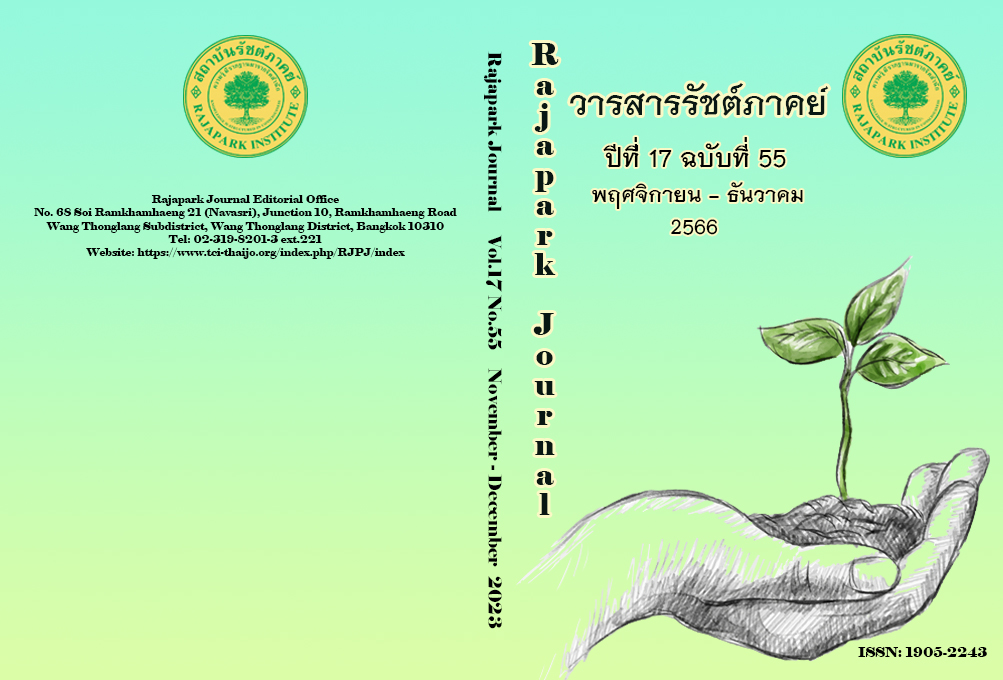Development of AI Capability in Early Childhood with Unplugged Activities
Main Article Content
Abstract
This academic article aimed to introduce a method to support early childhood pupils in learning about Artificial Intelligence, which is an important technology widely used in many equipment. In the view of the general public, learning about the concept and technology of AI should be done with electric equipment or computers, so-called plugged activities. However, preschool children learn through experiences from their five physical senses, i.e., seeing, hearing, smelling, tasting, and touching, which accumulate to become their skills. These experiences can be gained through unplugged activities such as word cards, board games, and AI equipment mock-ups. Therefore, early childhood teachers can develop the AI capability of their children with unplugged activities.
Article Details

This work is licensed under a Creative Commons Attribution-NonCommercial-NoDerivatives 4.0 International License.
Views and opinions appearing in the Journal it is the responsibility of the author of the article, and does not constitute the view and responsibility of the editorial team.
References
Association for the Advancement of Artificial Intelligence (AAAI) and the Computer Science Teachers Association (CSTA). (2021). Five Big Ideas in Artificial Intelligence. https://ai4k12.org/wp-content/uploads/2022/01/AI4K12_Five_Big_Ideas_Poster_3_19_2021.pdf
Bers, M. U., Flannery, L., Kazakoff, E. R., & Sullivan, A. (2014). Computational Thinking and Tinkering: Exploration of an Early Childhood Robotics Curriculum. Computers & Education, 72, 145–157.
Bruner, J. (1977). The Process of Education. Harvard University.
Davidson, C. N. (2011). Now You See It: How the brain science of attention will transform the way we live, work, and learn. Viking.
Jenkins, H. (2006). Confronting the Challenges of Participatory Culture: Media Education for the 21st Century. The John D. and Catherine T. MacArthur Foundation.
Kandlhofer, M., Steinbauer, G., Hirschmugl-Gaisch, S., & Huber, P. (2016). Artificial intelligence and computer science in education: From kindergarten to university. In Proceedings of 2016 IEEE Frontiers in Education Conference, (12-15).
Looi, C. K., How, M. L., Longkai, W., Seow, P., & Liu, L. (2018). Analysis of linkages between an unplugged activity and the development of computational thinking. Computer Science Education, 28(3), 255-279.
Office of the Basic Education Commission of Thailand (2017). Early Childhood Education Curriculum B.E. 2560 (2017). Ministry of Education of Thailand.
Office of the Education Council of Thailand. (2017). Thai National Education Plan B.E. 2560-2579 (2017-2036). Ministry of Education of Thailand.
Office of the Permanent Secretary, Ministry of Education of Thailand. (2020). Ministry of Education of Thailand’s’ Strategic Plan B.E. 2563 – 2565 (2020-2022). Ministry of Education of Thailand.
Phisalaphong, R., Srisomboon, P., Waelveerakup W., Sasungnoen, J., & Mahajaroen, S. (2022). Report on The Development of Artificial Intelligence (AI) Learning Innovation for Early Childhood Pupils. Nakhon Prathom.
Piaget, J. (1973). The Child and Reality. Crossman.
Royal Society of Thailand (2019). Artificial Intelligence (AI). https://web.facebook.com/RatchabanditThai
Russell, S. J., & Norvig, P. (2020). Artificial Intelligence: A Modern Approach (4th ed.). Pearson.
Sigelman, C. K., & Rider, E. A. (2012). Human Development Across Life-span (7th ed.). Wadsworth Cengage Learning.
Sousa, D.A. (2011). How the Brain Learns (4th ed.). Corwin Press.
Su, J., & Yang, W. (2022). Artificial Intelligence in Early Childhood Education: A Scoping Review. Computers and Education: Artificial Intelligence, 3, 10049.
Takanishi, R. (2010). Pre-K-Third Grade: A Paradigm Shift. In J. Andrews & V. Washington (Eds.), Children of 2020: Creating a Better Tomorrow (pp. 28–31). Council for Professional Recognition.
TeachThought Staff. (2014). 10 Roles for Artificial Intelligence in Education. https://www.teachthought.com/the-future-of-learning /roles-for-artificial-intelligence-in-education/
UNICEF. (2021). Policy Guidance on AI for Children. https://www.unicef.org/globalinsight/media/2356/file/UNICEF-Global-Insight-policy-guidance-AI-children-2.0-2021.pdf
Vygotsky, L. S. (1978). Mind in Society: The Development of Higher Psychological Processes. Harvard University.


